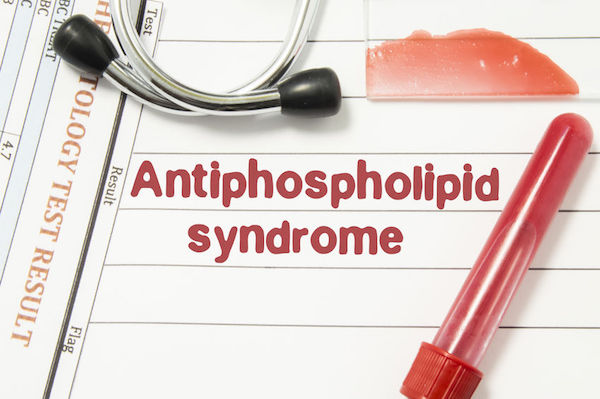Antiphospholipid syndrome (APS) is an immune system disorder, causing a risk of forming blood clots. It is also called Hughes Syndrome and Sticky Blood Syndrome.

APS can cause blood clotting in your arteries or veins and is a major cause of miscarriage and stillbirth. It’s also one of the most common causes of strokes in young people. One in five people who’ve had a stroke before the age of 40 may reportedly have APS. It is most common among people aged between 20 and 50.
A combination of genetic and environmental factors is thought to be responsible for APS.
What are its symptoms?
APS doesn’t always cause obvious problems, but in some cases symptoms mimic those of multiple sclerosis (a common condition affecting the central nervous system).
The two main problems caused by APS are blood clotting and pregnancy problems.
Blood clotting can occur in:
- Veins: This leads to pain and swelling, usually in the calf (deep vein thrombosis or DVT). This may lead to pulmonary embolism if a piece of the clot breaks off and moves to the lung
- Arteries: This may lead to high blood pressure (hypertension) or strokes
- Brain: Can cause memory loss, migraines, slurred speech and fits
In pregnancy, APS can result in recurring miscarriages. This can happen at any time during pregnancy but is most common between three and six months.
Other problems sometimes associated with APS include:
- Heart problems
- Kidney problems
- Infertility
- Skin problems
- Low blood platelet count
- Joint pain
How is it diagnosed?
APS can typically only be diagnosed if you have a positive blood test and after thrombosis or miscarriage. More and more people who have suffered either of these are tested for APS. If you’ve had either of these problems, especially if they’ve happened more than once, you should discuss with your doctor whether you need these blood tests.
Depending on the results, your doctor may want to refer you to a specialist (either a rheumatologist or haematologist).
There are three main blood tests used to diagnose APS. These are:
- Anticardiolipin test
- Lupus anticoagulant test
- Anti-beta-2-glycoprotein I test
What are your treatment options?
There is no cure for APS, but various treatments are available. These include:
- Anticoagulants: The main treatment for APS is anticoagulant therapy. Anticoagulants (such as warfarin, aspirin, and heparin) slow down the body’s ability to make blood clots. People with APS often take anticoagulants indefinitely, so reducing or preventing clots from forming in the future. There are side effects, however. With anticoagulants, injuries such as cuts bleed longer as the blood clots more slowly.
- Lifestyle: People with APS are encouraged to make make healthy lifestyle choices, such as including exercising regularly, following a healthy diet to avoid weight gain, and not smoking. These lifestyle changes may reduce your risk of developing clots.
Can it be prevented?
There are no known ways to prevent APS. Treatment, however, can help people ease some of the symptoms and live normal, active lives.
IMAGE CREDIT: 123rf.com
